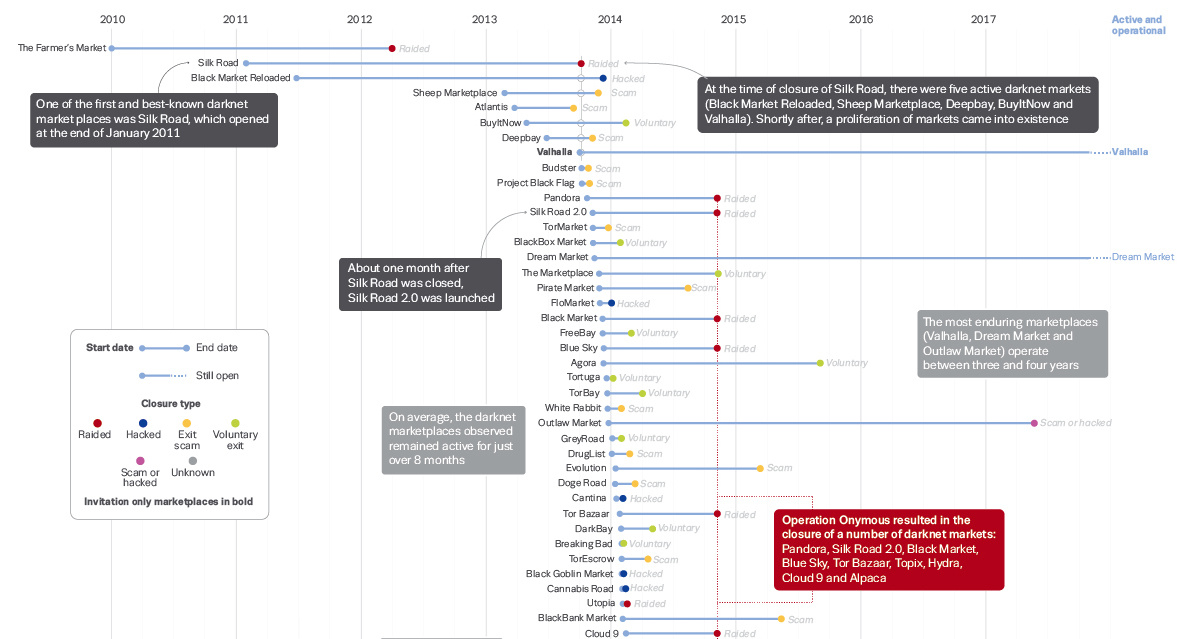The dark web has long been a subject of interest and concern, capturing the attention of both law enforcement and curious individuals alike. Concealed beneath the facade of the internet, the darknet operates as a murky marketplace where a multitude of goods and services can be found, often beyond the reach of conventional regulations. While it is frequently associated with illegal activities, the reality of dark web markets is much complex, revealing a range that ranges from prohibited substances to legitimate offerings.
In recent years, these online marketplaces have evolved, reflecting changes in tech, user needs, and cultural attitudes. Some markets have been shut down in high-profile operations, while others have emerged, adjusting to an ever-changing landscape. This article delves into the diverse offerings of dark web markets, exploring how they function, what is on offer, and the implications of their existence for both buyers and society at whole.
Comprehending Darknet Marketplaces
Dark web markets are digital platforms that exist on the dark web, permitting users to purchase and sell a variety of goods and services, frequently anonymously. Such marketplaces can vary from legitimate items, such as digital products and privacy-enhancing tools, to illegal offerings, including drugs, weapons, and stolen data. The concealment provided by the darknet is a crucial factor in the operation of these markets, as it protects users from law enforcement and potential consequences.
Entering dark web markets typically requires specific software, such as Tor, which masks the user's IP address and encrypts internet traffic. This offers a layer of privacy that attracts a varied user base, comprised not only of buyers and sellers but also of those looking for information or participating in discussions about privacy and security. The distinct ecosystem within these platforms often includes user reviews and feedback mechanisms to build trust among participants, even with the inherent risks involved.
The proliferation of dark web markets has fostered both interest and concern from multiple sectors, including law enforcement and cybersecurity experts. While these markets can enable illicit activities, they also bring up questions about digital privacy, the ethics of online trading, and the effectiveness of current regulations. As dark web markets continue to evolve, they offer a complex landscape that mirrors broader societal trends towards anonymity in digital communication and commerce.

Types of Goods and Services
Shadow markets are known for their varied range of goods and services that cater to a number of interests and needs. One of the most notorious categories includes illegal drugs. darkmarket 2025 Users can find everything from marijuana to synthetic opioids, with sellers offering different strains, quantities, and potency levels. The anonymity of the dark web allows users to browse options without the fear of legal repercussions, creating a special ecosystem for buyers and sellers alike.
In alongside narcotics, dark web platforms also provide entry to fake items. This can range from phony IDs to replicated credit cards and luxury goods. Merchants often take considerable attention in creating realistic replicas, and consumers often seek these products for different purposes, including evading law enforcement or taking part in fraudulent activities. The increase of these goods highlights the risks associated with involving oneself in dark web transactions.
Another significant offering on dark web markets is hacking services and digital tools. This includes all kinds from phishing tools and malware to complete hacking services aimed at penetrating networks and taking sensitive information. These services attract people or collectives with malicious intent, tapping into a increasing demand for digital crime activities. The dark web has effectively become a hub for those looking to take advantage of vulnerabilities in online safety, reflecting the shifting landscape of crime in the modern age.
Legal Risks and Dangers
Engaging with dark web platforms presents substantial law-related risks, often differing by region. Numerous activities associated with these markets, such as buying forbidden drugs, weapons, and hacked information, are criminal offenses. Law enforcement authorities have developed advanced techniques to trace participants and vendors, which can lead to arrests and legal actions. Users may naively believe their anonymity protects them, but the reality is that many instances show users being detained for their online activities.
Additionally, the risks involved extend beyond legal prosecution. Users face potential deceptions and swindles, as the illicit web does not have the comparable consumer safeguards as mainstream markets. Purchasers can lose money on forged products or be unable to get items completely. Furthermore, engaging in deals on these markets can also subject individuals to harmful entities that may resort to intimidation, aggression, or extortion if they perceive a buyer as weak.
Finally, there are wider societal implications of illicit web platforms that cannot be disregarded. Their presence sustains criminal trades and destroys authorized companies. The distribution of unlawful products and services can lead to escalated crime, addiction, and social damage. Both users and the broader community must understand the far-reaching effects of participating in these hidden platforms, as they play a role in sustaining a pattern of illicit conduct and its related dangers.
